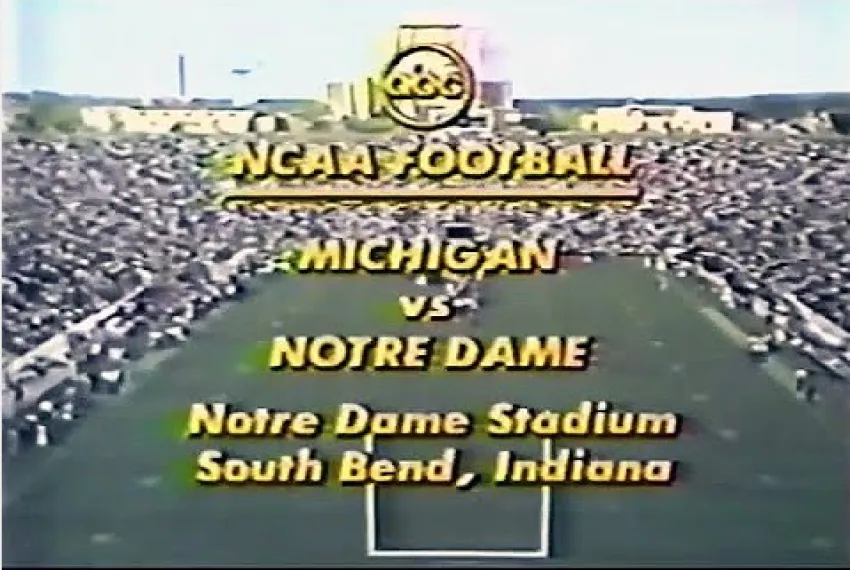joe montana

Previously: 2004 Michigan State, 1992-93 Rose Bowl
We're back to break down another vintage Michigan Football game. This is the third game of the series and today we are jumping back in time another substantial amount to cover the 1978 clash between Michigan and Notre Dame in South Bend. It features a matchup of famed quarterbacks in Joe Montana of Notre Dame and Rick Leach of Michigan and is our first game of both the 1970s and Bo Schembechler's tenure as coach. It's also a significant game for historical purposes, as it was the first edition in the re-started rivalry between the two sides, the first meeting between Michigan and Notre Dame in 35 years. After this 1978 meeting, the Wolverines and Fighting Irish would play nearly every year for four decades before the end of the rivalry in the 2020s.
The team: Michigan came into 1978 on the heels of back-to-back Big Ten Championships, which included wins over Ohio State. The 1976 and 1977 seasons were close to identical, perfect non-conference slates, 7-1 records in conference featuring one random loss but wins over both MSU/OSU, and then a loss in the Rose Bowl (to USC in '76 and to Washington in '77). The 1978 season was to be Rick Leach's senior year, the starting QB entering his fourth season at the helm of Bo Schembechler's option offense. Leach was one piece of the previous year's rushing attack that mostly all returned for '78, starting tailback Harlan Huckleby (743 rushing yards in '77) and fullback Russell Davis (1013 yards), as well as reserve back Roosevelt Smith (308 yards). Both Davis and Huckleby had been All-Big Ten in 1977, as had Leach.
The blockers in front of them had seen some changeover. Just two returning starters rolled over to 1978, the right side of the line featuring Bill Dufek and John Powers, while the remainder of the line had headed off to the draft (LT Mike Kenn had gone on to be picked in the first round, starting an illustrious pro career). Thus, new starters Steve Nauta (C), Greg Bartnick (LG), and John Giesler (LT) were filling in on an offensive line. Due to the new faces, 1978 would be an offensive line that Craig would remember as "pedestrian".
Michigan didn't pass the ball much during this period of the Schembechler era, Leach attempting 147 total passes in 1977 over 12 games (he'd up that to 158 in 1978), but when he did throw he would be targeting returning starters at receiver spots. TE Gene Johnson was back for his senior season, while 1977's leading receiver Ralph Clayton (wingback) was also a senior starter. The 1978 team would give more attention to some relatively new faces, Doug Marsh being a breakout contributor at TE and true freshman tailback Butch Woolfolk seizing a key part of the offense (Lawrence Reid re-emerged to get 50 carries as well). The Wolverines had cobbled together a good offense in '77, but these new contributors and increased experience at the skill positions would take it to another gear, from 17th in scoring offense to 4th in 1978.

[Bentley Historical Library]
On defense, Michigan was still running a 3-4 under DC Bill McCartney (Jack Harbaugh was DBs coach at this time). Along the line, Dale Keitz and Curtis Greer were returning starters at middle guard and shortside tackle, respectively, with Greer becoming the star of the line in 1978. Chris Godfrey rounded out the defensive front, but more stars were found at the ILB/OLB level. Ron Simpkins was a returning starter at ILB and like Greer, he'd raise his game to superstar status in 1978 en route to being an All-American in '79. Bob Hollway, Mark DeSantis, Tom Seabron, and Jerry Meter were part of the group rounding out this position, Meter also earning All-Big Ten honors in 1978.
The defensive backfield featured 1st Team All-Big Ten honoree Mike Jolly and a combination of Mark Braman and Gerald Diggs stepping up to take a starting role at halfback (corner in modern terms). Mike Harden was a fresh-faced starter at free safety and would earn all-conference honors, while the strong safety spot (known as the "wolf" at the time) entered the year with a competition between Stuart Harris and Dan Murray. As a whole, only five starters returned on defense but it wouldn't matter, Michigan finishing with the second-best scoring defense in the country in 1978, allowing only 8.8 points per game against. As Craig remembers the depth chart: "when you just look at the names, the offense was better. But the defense really achieved, except against MSU. Nobody moved the ball but MSU on us". Not bad.
[AFTER THE JUMP: The game]
48